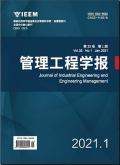管理工程学报2024,Vol.38Issue(4):182-195,14.DOI:10.13587/j.cnki.jieem.2024.04.012
合作社介入对农产品供应链合作的影响研究
The role of cooperative intervention in an agricultural supply chain
摘要
Abstract
Nowadays,tackling poverty is one of China's major strategies,and the"company+cooperative+farmer"model has played a crucial role in the process.One of this model's advantages is solving the production and marketing problem in agricultural supply chains.Previous studies,which consider this model,mainly focus on the role of companies or governments in providing sales channel and demand information for farmers,but few explore the role of cooperative intervention in procurement contract design in agricultural supply chains. In this paper,motivated by the"company+cooperative+farmer"model,we develop a bargaining model to explore the procurement problem in an agricultural supply chain.The company in our paper is a social company.Such a company not only helps farmers solve the marketing problem but also cares about both its profit and the cooperative's welfare rather than its profit.We consider that the consumers are heterogeneous in the market,and we divide them into two types.One prefers the high-quality agricultural product,and the other prefers the low-quality agricultural product.The farmers in the cooperative are divided into two types according to their productivity,named by high-level farmers and low-level farmers.The high-level farmers grow the high-quality product and the low-level farmers grow the low-quality product.The yield levels of these two types of farmers are also different and uncertain. We model three functions of the cooperative according to practice in China,including:1)the company integrates farmers'information,including the farmers'types and yield levels,and the product quality;2)the cooperative enhances farmers'bargaining power and represents farmers to bargain with the company over the procurement price;3)the cooperative is responsible for planning and arranging agricultural activities,based on the company's standards. We divide the decision sequence into three stages.In the first stage,the cooperative should decide whether to provide the overall yield level information or the detailed yield level information of two types of farmers to the company.We design and compare two different procurement contracts.The first one is the unified procurement contract,under which the company purchases different types of agricultural products with the same procurement price;the second one is the differentiated procurement contract,under which the company purchases different types of agricultural products with different procurement prices.In the second stage,the cooperative and the company determine the purchase contract and the purchase price through negotiation.If they reach an agreement on the contract,they will sign a purchase contract,and the cooperative arranges agricultural activities;if the negotiation breaks down,no transaction happens between them.In the third stage,when the agricultural products are ripe,the company will purchase them according to the signed purchase contract,and then it process,package,and sell the agricultural products. By comparing the results of the two procurement contracts,we get the following results:1)In general,when outcomes are high-quality products with high yield and low-quality products with low yield(resp.high-quality products with low yield and low-quality products with high yield),the cooperative will choose to provide the detailed(resp.overall)yield level information and the cooperative and the company will achieve cooperation through the differentiated procurement contract(resp.unified procurement contract);2)The social company only cares about the overall welfare of farmers,while the cooperative is responsible for coordinating the distribution of overall welfare among farmers.Especially,under the differentiated procurement contract,the cooperative could coordinate the distribution of overall welfare among farmers according to the Shapley value model;3)To meet the diversified needs of consumers for agricultural products,the cooperative should arrange farmers with different abilities to grow different agricultural products(e.g.,high-quality products and low-quality products)according to the integrated information,which increases the utility of all parties. In summary,we demonstrate that the cooperative plays an important mediating role in the"company+cooperative+farmer"model.Our results reveal that:1)integrating farmers'information is one of the advantages of the cooperative,which affects the bargain with the company over the procurement contract;2)the cooperative should arrange agricultural activities according to farmers'types to meet consumers'diversified needs;3)the cooperative is responsible for the distribution of welfare among farmers rather than the company.关键词
决策分析/农产品供应链/合作社介入/采购合同Key words
Decision analysis/Agricultural supply chain/Cooperative intervention/Procurement contract分类
管理科学引用本文复制引用
王子卓,张玲玲,王明征..合作社介入对农产品供应链合作的影响研究[J].管理工程学报,2024,38(4):182-195,14.基金项目
国家自然科学基金重点项目(71931009) (71931009)
国家自然科学基金重点国际合作项目(72010107002) (72010107002)
泰山学者工程专项经费(11030082363518) The Key Project of the National Natural Science Foundation of China(71931009) (11030082363518)
The Major International Joint Research Program of the National Natural Science Foundation of China(72010107002) (72010107002)
The Special Fund of TaiShan Scholars Project(11030082363518) (11030082363518)

